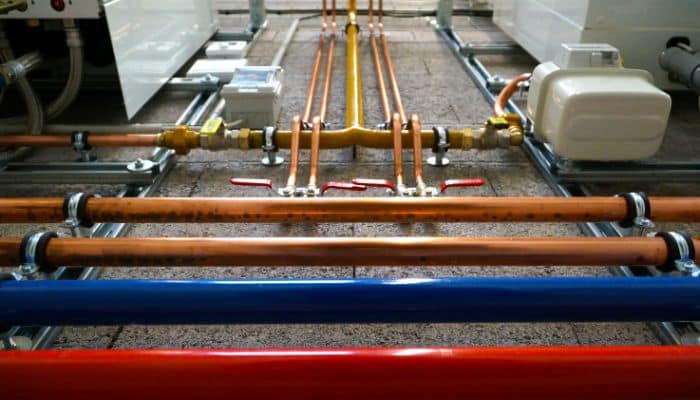Solar water heaters use energy from the sun to heat your home’s water supply, offering an eco-friendly and cost-saving alternative to traditional water heating. They help reduce electricity or gas bills, lower carbon emissions, and can qualify for tax incentives. However, they also come with high upfront costs and may perform less efficiently in cloudy or cold climates.
What Is a Solar Water Heater?
A solar water heater is a system that uses energy from the sun to heat water for household use. Instead of relying solely on electricity or gas, these systems harness solar power, making them an eco-friendly alternative to conventional water heating methods.
There are two primary types of solar heating systems:
1. Active systems – These use pumps to circulate water or a heat-transfer fluid through solar collectors.
2. Passive systems – These rely on natural convection and gravity for water circulation, with no mechanical pumps involved.
Both systems have the same goal: to reduce your reliance on traditional energy sources and lower your utility bills.
Advantages of Using Solar Water Heaters
1. Significant Energy Savings
One of the most attractive benefits of solar water heating is the potential for major energy savings. On average, solar heaters can reduce your water heating bills by 50% to 80%, depending on your location and usage habits.
Since the sun’s energy is free, you only pay for the equipment and installation. Over time, this can lead to substantial savings, especially in areas with plenty of sunshine.
2. Eco-Friendly and Sustainable
Switching to a solar heating system dramatically reduces your home’s carbon footprint. Traditional water heaters rely on fossil fuels, which emit greenhouse gases. In contrast, solar energy is renewable, clean, and non-polluting.
For eco-conscious homeowners, this is a compelling reason to make the switch.
3. Incentives and Tax Credits
Many governments offer rebates, tax incentives, and other financial perks to encourage homeowners to install solar water heaters. These benefits can significantly reduce your upfront costs.
Be sure to check local programs and consult a licensed contractor offering water heater service near you who is familiar with available incentives in your area.
4. Long-Term Cost Efficiency
Though the initial installation may be higher, solar water heaters typically have lower operating costs than electric or gas heaters. Plus, their lifespan ranges from 15 to 20 years—or even more with proper maintenance.
Over time, these systems tend to pay for themselves and provide a solid return on investment.
5. Low Maintenance Requirements
Most modern solar water heating systems require very little maintenance. An annual check-up by a qualified technician is usually enough to ensure everything runs efficiently.
You can easily find a water heating services that specializes in solar installations and maintenance.
Disadvantages of Solar Water Heaters
1. High Initial Installation Cost
One of the biggest drawbacks of solar water heaters is the upfront cost. Prices vary based on system type and size but often range from $2,000 to $5,000 (or more for large homes).
While tax credits and rebates help offset this, the initial investment can be a barrier for some homeowners.
2. Weather-Dependent Performance
Solar water heaters perform best in sunny climates. In areas with long winters, cloudy days, or limited sunlight, these systems may not meet your hot water needs without a backup system.
This means you might need to supplement your solar system with a traditional water heating unit, which can add to your costs.
3. Space Requirements
Solar collectors (panels) require a decent amount of roof or ground space to work effectively. If your roof doesn’t face the right direction or lacks the space, installing solar collectors might not be feasible.
Some homes may need structural modifications, further increasing the cost and complexity.
4. Slow Payback Period
Although solar water heaters can save money in the long run, it may take 7 to 10 years before you break even. If you’re not planning to stay in your home for that long, the financial return may not be as beneficial.
5. Potential for System Freeze in Cold Climates
In very cold climates, there is a risk that the water or heat-transfer fluid in your system may freeze. While modern systems have freeze-protection features, it’s still something to consider.
Final Thoughts: Balance the Pros and Cons
Like any major home upgrade, solar water heating systems offer both benefits and limitations. But for many, the pros far outweigh the cons—especially with rising utility prices and growing environmental awareness.
By doing your homework and planning ahead, you can enjoy reliable hot water while contributing to a more sustainable future.
Frequently Asked Questions (FAQs)
Q1: Do solar water heaters work on cloudy days?
Yes, but efficiency is reduced. Most systems include a backup heater for cloudy or rainy days.
Q2: How long does a solar water heater last?
Typically 15–20 years with proper maintenance.
Q3: Is a solar water heater worth it in cold climates?
It depends. In areas with freezing temperatures, you’ll need a freeze-resistant system and likely a backup heater.
Q4: Can I get solar panels and a solar water heater?
Absolutely! Solar electric panels and solar water heaters serve different purposes and can complement each other.


 855-410-TECH(8324)
855-410-TECH(8324) APPLY FOR FINANCING
APPLY FOR FINANCING